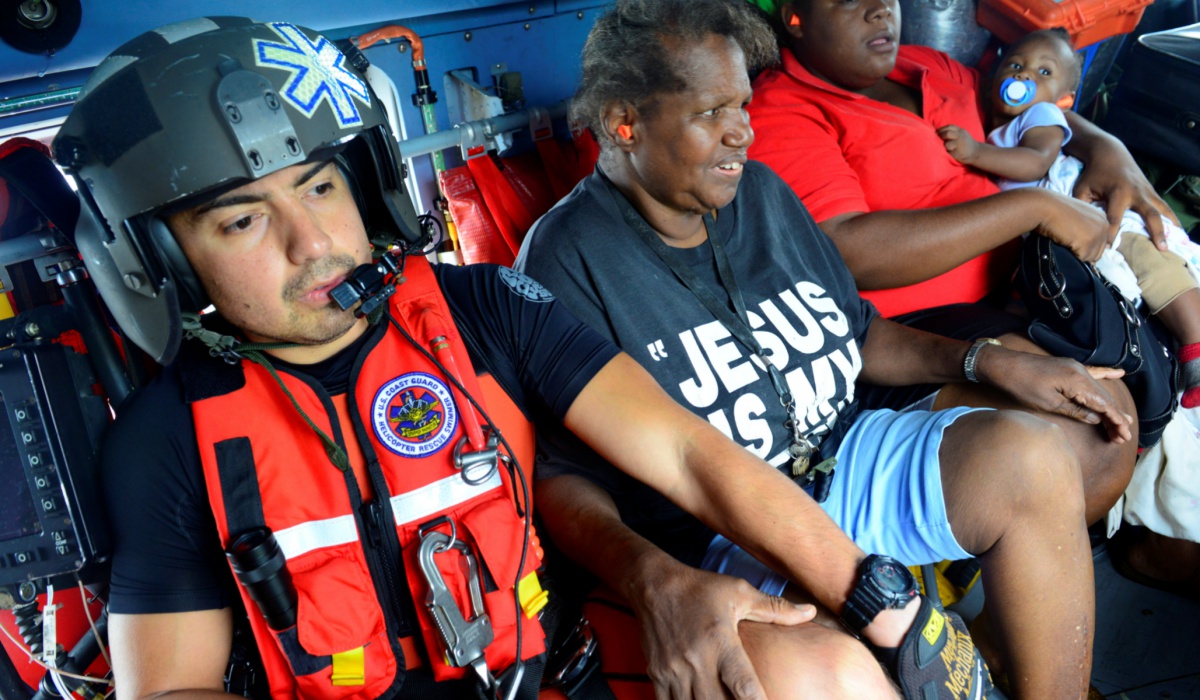by Kyle Smith – nationalreview.com – August 31, 2017
The piece’s problems didn’t end with the title.
‘Houston,” declared a Slate headline, “Doesn’t Showcase ‘America at Its Best.’” When a tweet promoting the article from the site’s official account went viral, and not in a good way, the editors reconsidered the wisdom of trolling a suffering city, deleted the tweet, and changed the title to “Why It’s Misleading to Say That Houston Showcases ‘America at Its Best.’” An accompanying photo showed a National Guardsman carrying a woman in hip-deep floodwaters.
Neither of these headlines quite captures the essence of the essay by Katy Waldman, though. Waldman thinks it’s unfortunate that the spirit in Houston today is bound to recede with the floodwaters. Underlying the piece is an old impulse of the Left dating back to Lenin and beyond: A wish to keep society in emergency mode because of the opportunities it opens up. Catastrophe tends to loosen up all that red tape that gets in the way of progressive action. Catastrophe leads to immediate mobilization. Catastrophe gives us spontaneous collectivism. Why can’t we have collectivism always and everywhere, not just in the Houston area when 50 inches of rain falls on it? Waldman is looking toward the aftermath of Harvey and fears that this disaster will be allowed, in the deathless words of Rahm Emanuel, to “go to waste”; i.e., it won’t lead to a major leftward turn for Texas or the U.S.
Am I being unfair in saying Waldman calls for a permanent mindset of catastrophe? Consider this passage: “These waterlogged suburbs have become zones of exemption, where norms hang suspended and something lovelier and more communal has been allowed to flourish in their place. . . . Disruptive events loosen our mores just enough to permit new kinds of compassion.” Waldman calls Houston today “a beautiful anomaly” and a “provisional utopia.” Absent catastrophe, America is just a “moral junior varsity team” where the usual rules are “selfish, capitalistic.” She concludes, “Humans may possess inherent goodness, but that goodness needs to be activated. Some signal has to disperse the cloud of moral Novocain around us. Some person, or fire, or flood, has got to say: now.” It’s chilling to observe a young writer openly thirst for destruction and chaos as a necessary first step to a more evolved humanity. As V. I. Lenin put it (quoting fellow revolutionary Georgi Plekhanov), “The worse, the better.”
The attitude is a familiar one on the Left: Capitalism, with its ethos of self-absorption, causes people to be cruel to one another. If only we could take filthy money-grubbing and profit-seeking out of human existence, we’d all live in a permanent rather than temporary Utopia.
But capitalism actually facilitates what F. A. Hayek called “the extended order of human cooperation.” You buy something from the shopkeeper, possibly something that carries an internationally known brand. Whether it’s Mom and Pop’s corner store or Ford Motor Co., every seller wants you to be happy. He wants to keep you coming back to buy again. If he sells you defective merchandise, or cheats you, you won’t be back. If he cheats many customers, he’ll have trouble staying in business. You and the people you buy things from, or sell things to, build up a dense web of commercial relationships. You become friendly with the guy who sells you coffee every morning. You grow to respect Tim Cook.
Houston is a racially, culturally, and ethnically diverse city, and these factors are commonly linked to distrust in society. Yet it also represents something close to the apotheosis of capitalism. With the exchange of money for goods and services comes mutual respect, friendship, trust. Under the extraordinary circumstances that obtain during a disaster, people are happy to temporarily put aside the profit motive and selflessly come to one another’s aid if they feel bonds with their neighbors. Capitalism built many of those bonds, built the social stability that comes with affluence.
When a centralized authority imposes a top-down ideal of social goodness in an attempt to reshape society into a groovy communitarian paradise, these capitalist webs of cooperation dissolve. Economic authority is replaced with a distant bureaucracy. In a government-run shop (even one as innocuous as the DMV or the post office), customer service is less important than obeying bureaucratic dictates, and the workers who are selling you stuff don’t care whether you come again. Long wait times ensue. Buyers and sellers become surly with one another. Trust and goodwill fizzle. People start to feel helpless.
‘Utopia’ means nowhere. It isn’t achievable.
Houston is not going to make the mistake of turning into a collectivist wonderland where acting in self-interest is ditched in favor of goodness commissars’ ordering everybody to do what’s best for all. “Utopia” means nowhere. It isn’t achievable. The conservatives in Texas understand this better than most, and they won’t be convinced that the daily marketplace interactions that take place because everyone wants more money are keeping us from achieving “something lovelier and more communal.”
Source: Slate: Houston Doesn’t Show America at Its Best, by Kyle Smith, National Review
 Listen Online
Listen Online Watch Online
Watch Online Find a Station in Your Area
Find a Station in Your Area









 Listen Now
Listen Now Watch Online
Watch Online
